Christmas is an amazing time. We try to be together with our loved ones and, forgetting all our worries, we look to the future with hope. It is a day of love and joy. The war time destroyed a beautiful tradition of family celebration. Already on the first wartime Christmas in 1939, many Polish families left not one, but several places on the Christmas Eve table for late guests.
The Poles who found themselves under German or Soviet occupation did not celebrate joyfully. Even so, great optimism was felt when making wishes and sharing the wafer. "Another Christmas is already in free Poland," it was said. Those who made these wishes did not know that they would be waiting for it for many years.
A small Christmas tree, a very modest Christmas Eve supper, great depression and sadness after the loss of loved ones and the repeated words "that Poland should be free ..."
- recalled Czesław Skorupski, a soldier of the 14th Greater Poland Infantry Division.
There were also cases when Christmas brought with it not joy, but sadness. As in the case of the family of priest prelate Czesław Wojtyniak, deputy field bishop of the Polish Army, murdered on Christmas Eve in a Soviet prison.
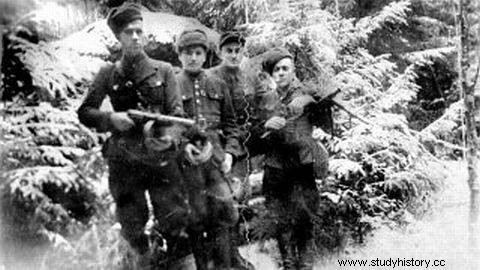
Christmas during the war was one of the saddest in history
Soldiers of many armies, conscripted into the army in September 1939, were also unable to celebrate in peace. They were far from home, they could expect a German attack at any moment, and there was no chance of a quick demobilization. In December 1939, nothing happened on the Western Front and the "strange war" was in full swing . The hope and improvement of the mood certainly did not come from the celebration of the Mass for peace by Pope Pius XII.
King George VI also spoke about the war, who in his message to the British people said:
The new year is coming. We cannot know what it will bring us. If he brings peace, how grateful we will be. If he brings about a continuation of the fight, we will remain steadfast.
Just a few days after Christmas in England, a food rationing plan was announced, which meant, for example, the introduction of meat cards . The Finns also had a restless and sad Christmas, waging a difficult and bloody war with the Red Army, which was more numerous and better equipped than the Finnish one.
Christmas'1940. Germany is winning against everyone!
The next Christmas in Europe was even sadder, as the prospect of defeating the Germans seemed very distant. The Third Reich was at the height of its power and was conquering other countries at a rapid pace. The year 1940 brought, among others, conquest of Denmark and Norway as well as conquest of Belgium, the Netherlands and France . Many soldiers ended up in prisoner-of-war camps, many were wounded and lay in hospitals, many were never to return home, and they were remembered by wooden crosses with a helmet on the top and a nailed board with a name on it.
For many prisoners it was the first, terrible Christmas behind the barbed wire of the recently established Auschwitz concentration camp. Those days turned out to be particularly tragic for the prisoners of the penal company. We know from the memoirs of prisoner Karol Świętorzecki that the Germans put a Christmas tree lit with electric lights on the assembly square, and placed the corpses of prisoners who died from cold and exhaustion during work and during the assembly under the tree. The cruel lagerführer Karl Fritzsch said that the bodies placed under the Christmas tree were "a gift for the living". He also forbade singing Christmas carols.
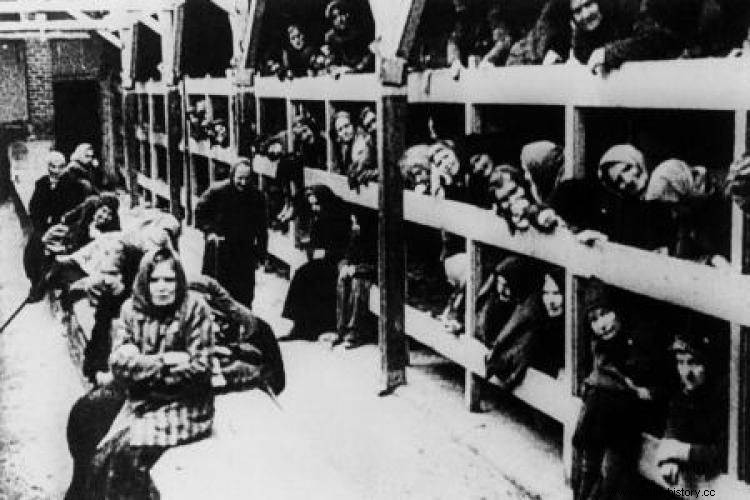
Christmas Eve in Auschwitz was an exceptionally difficult time for prisoners
Another witness of those events, Leon Mateja, recalled:
Immediately in the first year, in 1940, in our Krankenmann block, we set up a Christmas tree decorated with everything that could be obtained, and we sang. We sang Polish Christmas carols, there were SS men, there was Krankenmann, who was the executioner. I was standing on a stool and conducting the whole block and the Germans were sitting and asking us to sing more. Especially no food that would resemble Polish Christmas Eve was gone that day. Only memories, crying, homesickness, Christmas Eve. My only wish was to survive and get out of there. Nothing else. To see your loved ones as soon as possible were the only wishes that wandered throughout the camp.
On Christmas Eve 1940, Rudolf Hess delivered a message to the Germans:
God's grace has turned against England. We continue to fight to believe in the perfect worth of our people. Thanks to the Almighty who created the German nation and serves this nation, and to those who serve the Almighty with faith.
In England, unlike in Poland and other European countries, Christmas Eve is not celebrated. Christmas is celebrated from the morning of December 25 and that's when people give each other gifts. Therefore, as in the previous year, King George VI's Christmas speech took place on December 25. It was not as full of hope as in the previous year, because the greatest ally, which was France, was defeated at lightning speed, and the specter of a German invasion loomed over England. Like Rudolph Hess, the king of the United Kingdom also appealed to God:
The future will be difficult, but our feet follow the path of victory, and with God's help, we will obtain justice and achieve peace.
On the second Christmas, the Germans no longer paid attention to the holiday season and resumed bombing raids on London.
1941 - the end of the war is not in sight
The Christmas Eve of 1941 also did not bring hope to Poles in the occupied country and those forced to leave their homeland. The German occupation had lasted for over two years and its end was not going to be soon. At the same time, it was more and more severe. The Germans tried to intimidate the Poles by organizing round-ups and street executions. The sinister names "Pawiak" and "Aleja Szucha" were already well known . For those who were imprisoned in the Auschwitz concentration camp at that time, another terrible life lesson awaited. As many as 300 extremely exhausted prisoners from the Soviet commando were killed on their way from work . Christmas Eve in no way exempted the prisoners from participating in the roll-call, during which, in the bitter cold, they listened to the speech of Pope Pius XII, in addition in the hated German language. Another 42 people died then as a result of frost.
However, the Germans did not manage to break the spirit of those imprisoned in the "concentration camp" and deprive them of their hope of regaining their freedom. This is evidenced by the account of Józef Jędrzych, who recalled:
The singing of a German Christmas carol began, and then the song "God is born - the power melts" and others, as powerful as the sea, flowed, and in the final chord "Mazurek Dąbrowski" sang. Everyone hugged heartily, hot and cried for a long time, and there were those who sobbed loudly . Such a solemn moment is never forgotten. This Christmas stuck in my heart and memory forever.
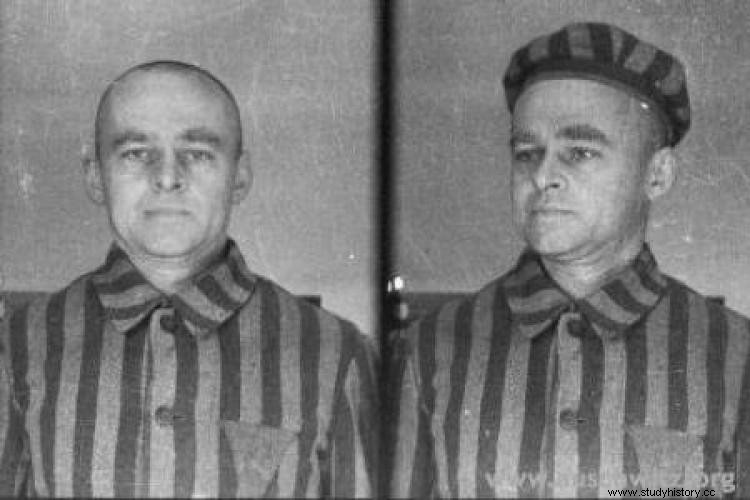
Witold Pilecki attached the sign of a white eagle to the Christmas tree in Auschwitz
Strength and optimism were brought to the prisoners by Captain Witold Pilecki, who attached a white eagle sign to the Christmas tree smuggled into the camp.
Just as during the 1939 Holiday there was no joy in the houses of the Finns, because of the ongoing winter war with the USSR, during Christmas in 1941, the Soviet citizens who were still cultivating their holiday customs did not smile happily. The successful German campaign, known under the code name "Barbarossa", shocked Stalin, the Soviet generals and the whole of society. Only winter stopped the Wehrmacht's march towards Moscow. Rodrick Braithwaite wrote about the people of Moscow:
People started buying Christmas trees in preparation for the celebration. There are new decorations - shiny glass bubbles, flags, dolls, electric lamps, figures of animals made of gilded cardboard.
As every year during Christmas, the King of England, George VI, delivered the message to the nation:
Never before has any heroism shone with a shine greater than now, such as bravery and fortitude, sacrifice, sympathy and neighborliness.
1942. The first ray of hope
The holidays of 1942 were sad in most European countries, especially in the countries occupied by the Third Reich, which were destroyed and used in every way. Though the myth of the indestructible German army was undermined in distant Stalingrad, many realized that it was still a long, long time to the end of the war.
The prisoners of the German concentration camps experienced a difficult and desperate period once again. At Christmas, they were not released from the atrocities committed by the Nazis. In Auschwitz II-Birkenau, the Germans organized a common Christmas tree. They ordered the murdered men to be placed under a tree placed in the women's camp. . Krystyna Aleksandrowicz recalled this shocking event:
In 1942, before Christmas, SS men arranged a Christmas tree for us. On Christmas Eve in the men's camp, a commando of men was gathered and they were ordered to carry soil in their jackets. Whoever collected too little was killed with a shot. A whole pile of corpses was then placed under the Christmas tree.
Despite the terrible circumstances, the Polish prisoners in Stabsgebaude managed to "civilize" this terrible place a bit. Candles were lit on a spruce branch that was found and brought in secretly . Carols were sung in many of the camp barracks, which was encouraging and gave hope for survival. Christmas Eve in Block 18a was of a religious nature. Prisoner - a Catholic priest received bread from his fellow prisoners, made it a host and celebrated the mass.
The deteriorating position of the Wehrmacht near Stalingrad meant that the soldiers fighting in this city were preparing for the upcoming Christmas from the beginning of December. They stockpiled food and alcoholic beverages to make Christmas Eve and Christmas different from the gloomy days in the ruins. A sub-unit of the 297th Infantry Division killed a workhorse early enough to make a "horse sausage" for Christmas gifts . Advent wreaths were woven from steppe grass instead of Christmas tree twigs, and Christmas trees were cut from wood to feel at least a little at home. A passionate pianist commander went to the infirmary with a bottle of champagne to cheer up the wounded. After the cups were filled, four Soviet missiles exploded nearby. The champagne spilled out, and of the soldiers outside, one was killed and another three wounded. A mortally wounded soldier was singing the Christmas carol "O du fröhliche".
The other commanders also found time to meet their men. This had a positive effect on the soldier's morale and was an opportunity to give each other small gifts. - The division commander gave us a drink from his bottle and brought a bar of chocolate - recalled one of the soldiers fighting at Stalingrad.
Christmas in 1942 was the occasion for another image fraud perpetrated by the Propaganda Minister Joseph Goebbels . Listening to the radio broadcast, German soldiers imprisoned in Stalingrad heard a voice announcing "Tu Stalingrad" and after a while a choir singing "Stille Nacht, heilige Nacht" resounded. The implementation of the broadcast was carried out in such a way that the audience had the impression that the song is being sung on the Volga. . But, of course, the broadcast was broadcast from a studio in Berlin and in no way improved the morale of the soldiers fighting in the "city of Stalin". In addition, on Christmas Eve the temperature dropped to -25 degrees, but as soldiers recall, the night was "beautiful and starry".
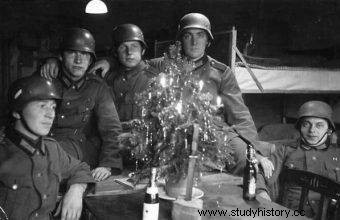
Wehrmacht soldiers during Christmas Eve in one of the field bunkers on the Eastern Front
On December 24, 1942, British soldiers who fought against the German Afrika Korps in North Africa did not experience rest and peace - they regained their lost position in Tunisia the day before. However, the order was gladly accepted that any further offensive would be suspended until the end of the rainy season.
Also the American command did not allow the soldiers to rest on Christmas Day . On that day, in Guadalcanal, belonging to the Solomon Islands archipelago, the order was given to attack the Austen heights. However, the Americans were held back by the Japanese fiercely defending themselves - only 500 strong. The next day the hill was attacked again, but with a similarly miserable effect, despite the artillery and air support.
Christmas 1943. The beginning of the end?
The next, wartime Christmas in 1943 brought little improvement to KL Auschwitz prisoners. In November, Arthur Liebehenschel took the position of the commandant of the main camp, treating prisoners a little more gently. This time there were no executions and no cruel actions of mental torment, moreover, for the first time prisoners were allowed to receive packages from their families . The received wafer was also shared with Jews who did not celebrate Christmas, but the common misery in the camp was a sufficient reason to celebrate together. In many barracks, the prisoners, to the best of their ability, organized Christmas Eve suppers.
Christmas Eve in 1943 was probably joyful for General Dwight Eisenhower, who by joint decision of Roosevelt and Churchill was appointed Supreme Commander of the Allied Expeditionary Forces in Northwest Europe. In the Far East, the Americans carried out several missions to bomb Japanese military installations in the Bismarck Archipelago on Christmas Day . On the first day of Christmas 1943, many American pilots spent in the cockpits of their aircraft, as 86 bombers were dispatched from the flight deck of Aircraft Group 2, commanded by Admiral Frederick Sherman, to bomb Japanese bases.
On December 25, 1943, the Soviet soldiers succeeded in cutting off the railway connection between Vitebsk and Połack for the Germans. On December 26, the Red Army resumed the second stage of Operation Oranienbaum - the transfer from Leningrad to Oranienbaum of the 2nd Strike Army through the waters of the Nevska Bay.
It was especially joyfully celebrated in London, as the Royal Navy finally managed to sink the legendary and formidable German battleship Scharnhorst during the Battle of Nordkapp . From 1968, crew members died until 1932, including Rear Admiral Erich Bay. The shipwreck lies at a depth of 300 meters, 100 nautical miles north-east of Nordkapp, in the Barents Sea. Its position was established by the Norwegian Navy, which hit the wreckage in September 2000.
Christmas'44. The end is nigh!
The atmosphere of the Christmas Eve supper in 1944 was completely different. It was already known throughout Europe that the days of the Third Reich were numbered, although in the Ardennes there were bloody battles with the Germans who carried out their last, great offensive. In the east, liberation was expected in the coming days, weeks at most. Soon, on January 12, the great Soviet offensive called Operation Wislańsko-Odra was about to start from the Vistula River.
In Auschwitz, a priest from Oświęcim, Władysław Grohs de Rosenburg, with the silent consent of the block and room supervisors, celebrated the Midnight Mass at midnight . Women from the Birkenau sub-camp prepared a "Christmas" for children in the hospital. From the material provided by the prisoners, they sewed about 200 toys. Each was accompanied by two pieces of sugar or hard candy. The packages were signed with the child's name and surname. On Christmas Eve they were handed out by a prisoner dressed up as Santa Claus . In 1944 Leokadia Szymańska, a prisoner from Birkenau, who was lying in the camp hospital, made a Christmas tree, which today is in the collection of the Auschwitz-Birkenau State Museum. She stuck Polish flags on her dress. The tree was crowned with a Polish eagle.
We arranged a Christmas tree in the block. We brought one from the field, we brought some twigs somewhere, we dressed up a Christmas tree and sang Christmas carols in secret. This is how it was done
- recalled the prisoner Janina Smutek.
Some prisoners, as in the previous year, received parcels from their families, but only small parcels were allowed, and their contents often had to be shared with the room supervisor or the block supervisor.
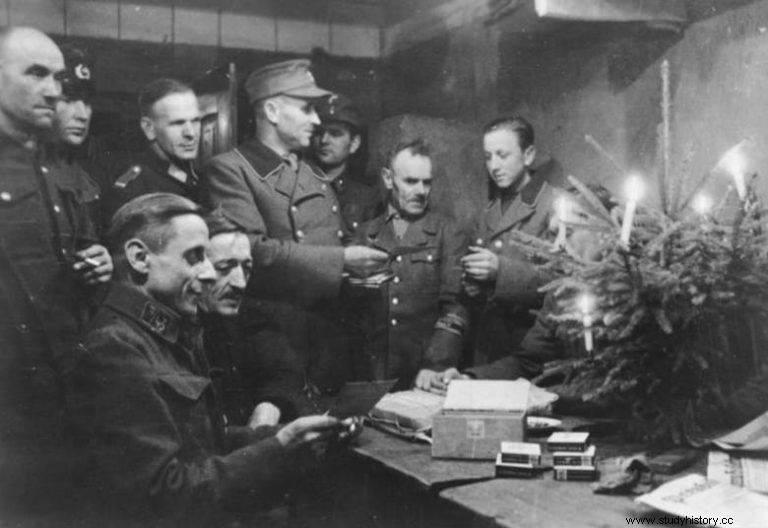
Volkssturm soldiers (1944)
On the Eastern Front, the Red Army pushed forward sharply, driving the Germans out of Budapest on Christmas Eve. The desperately fighting German u-boats managed to sink as many as four Allied ships that day. The Americans landed on Luzon - the main island of the Archipelago of the Philippines on Christmas 1944 . There were still long fights ahead of them for the next Philippine islands, and later, among others, for Iwo-Jima and Okinawa. The German submarines were still fighting, on December 25, the u-boats sank another three Allied units.
1945. Post-war Christmas
Although the next year brought the long-awaited end of the war, the post-war Christmas 45 not everyone allowed for joy and a smile. Especially in Poland, many people celebrating at the Christmas tree and the Christmas Eve table mourned their lost relatives, thought about those imprisoned in concentration camps and prisons, or remembered those who decided not to return to Poland after the war. In Eastern Europe cut off from the West by the "Iron Curtain", another, slightly different period of occupation began, which lasted until 1989, but that is a topic for a completely different story ...
Łukasz Grześkowiak, Paweł Szymański
Bibliography:
- H. Buell, World War II - The Complete Chronicle Of The World's Greatest Conflict, Black Dog &Leventhal Publishers 2002,
- OŚ Oświęcim - People - History - Culture, No. 8, 2008,
- http://auschwitz.org/
